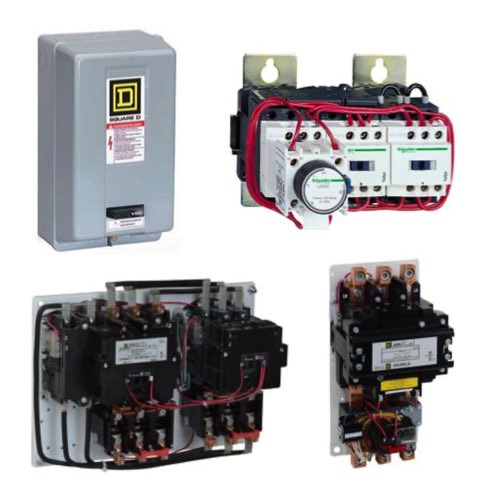Schneider Electric Motor Starters

RSP Supply carries a full line of Schneider Electric motor starters engineered for efficient, reliable motor control and protection across industrial and commercial applications. Designed to handle a variety of starting methods and operating conditions, these starters safeguard motors from overload, short circuits, and mechanical stress while ensuring smooth performance and long service life.
Schneider Electric’s lineup includes direct-on-line (DOL), reversing, and reduced voltage or soft starters, offering solutions for small machinery and large-scale automation systems alike. Each unit integrates thermal and overload relays for added protection, ensuring motors operate safely under demanding conditions.
These starters are compact and easy to install, fitting neatly into control panels where space efficiency matters most. Many models also feature smart connectivity options for integration into industrial automation and remote monitoring systems, allowing for greater control, diagnostics, and uptime management.
FAQs
Q: What types of Schneider Electric motor starters are available?
Schneider Electric offers direct-on-line, reversing, and reduced-voltage (soft) motor starters, providing tailored control solutions for a variety of motor sizes and applications.
Q: Do Schneider Electric motor starters provide overload protection?
Yes. Most models include integrated overload relays and thermal protection to prevent damage from overcurrent, overheating, or prolonged start-up cycles.
Q: Can Schneider Electric motor starters be integrated into automation systems?
Absolutely. Many Schneider Electric motor starters are compatible with PLCs and automation networks, enabling remote monitoring and control for greater system efficiency.
Q: What industries typically use Schneider Electric motor starters?
They’re widely used in manufacturing, HVAC, water treatment, material handling, and process automation, where reliability and precision motor control are essential.
Q: Are Schneider Electric motor starters easy to install and maintain?
Yes. The starters feature compact designs, intuitive interfaces, and modular configurations, simplifying installation and maintenance in tight control panels.
Why Buy Schneider Electric Motor Starters from RSP Supply
At RSP Supply, we specialize in providing genuine Schneider Electric motor control products with the expertise to help you find the right solution for your application. Our extensive inventory, competitive pricing, and fast shipping ensure that you can keep your operations running smoothly without delay.
Whether you need compact starters for HVAC systems or advanced soft starters for industrial automation, RSP Supply delivers the performance and support your business depends on.

